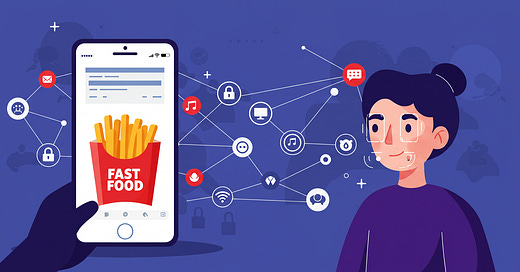Fast food apps make ordering quick and easy, but they often collect more personal data than you realize, putting your privacy at risk.
Why It’s Important
Understanding how fast food apps handle your data is essential. Many of these apps gather extensive personal information, which can be used for marketing, shared with third parties, or even exposed in security breaches. Without careful management, your digital footprint could be larger than intended.
What It Is / How It Works
Fast food apps allow users to place orders, earn rewards, and make payments seamlessly. However, the convenience comes at a price—extensive data collection. Here’s what these apps typically access:
Location Data – Tracks your whereabouts to suggest nearby restaurants and location-based promotions.
Personal Information – Requires names, phone numbers, and email addresses for account creation and marketing.
Payment Details – Stores credit card information for fast transactions, making it a potential target for cyber threats.
Device Information – Some apps collect data on the type of device used, which can be leveraged for profiling and ad targeting.
Behavioral Data – Tracks order history, preferences, and frequency to customize promotions and advertising.
While these features enhance the user experience, they also create potential vulnerabilities, exposing sensitive information to companies, advertisers, and hackers.
How to Mitigate It
To protect your privacy while still enjoying the convenience of fast food apps, follow these steps:
Review App Permissions – Disable unnecessary permissions, such as location tracking, unless required for delivery services.
Use Guest Checkout – If possible, avoid creating accounts and use guest checkout to minimize personal data exposure.
Regularly Update Apps – Ensure apps are updated to patch security vulnerabilities and reduce potential risks.
Limit Personal Information – Provide only the mandatory details required for transactions—skip optional fields.
Use Virtual Payment Methods – Consider using digital wallets or one-time-use credit card numbers to avoid storing sensitive payment data.
Adjust Privacy Settings – Review and modify privacy preferences within the app to restrict data sharing.
Stay Alert for Breaches – Monitor reports on data breaches involving apps you use and change credentials if necessary.
Exclusive Deals and What They Cost You
Many fast food apps offer special promotions, personalized discounts, and loyalty rewards in exchange for user data. While these perks can save money, they also encourage more data collection and tracking. It’s important to weigh the benefits of discounts against the potential privacy risks.
Be Smart About Your Digital Footprint
Fast food apps are a convenient tool, but they come with hidden privacy costs. By taking control of your app settings and being mindful of the data you share, you can enjoy the convenience while keeping your personal information secure.
Get your free personal cybersecurity & privacy assessment here
Stay secure, stay confident—CyberLife Coach is here to guide you every step of the way!




